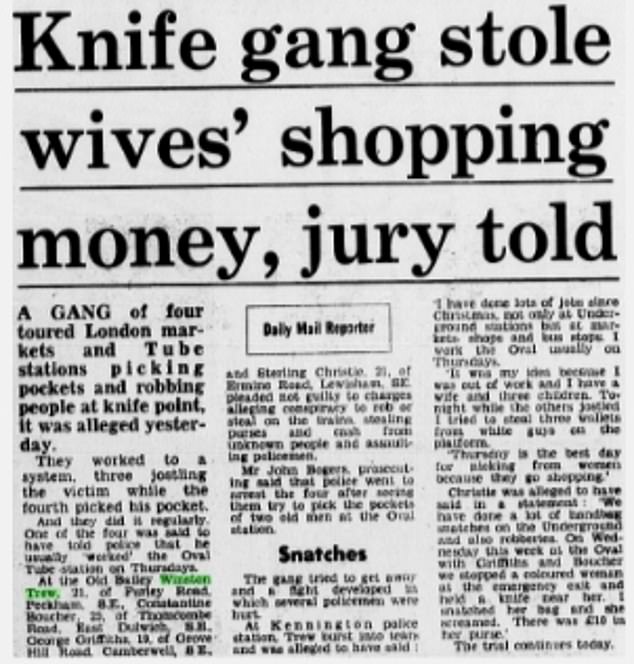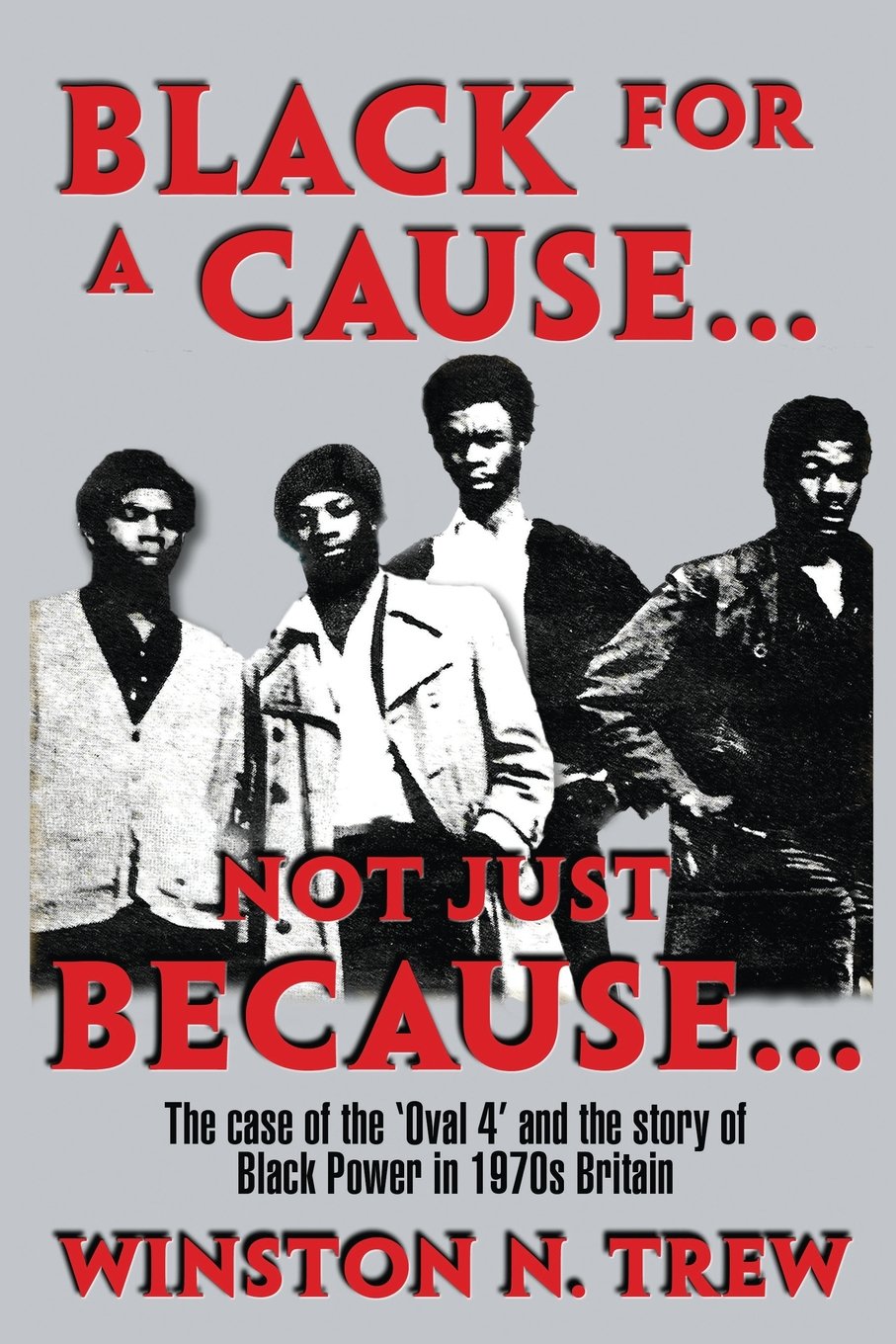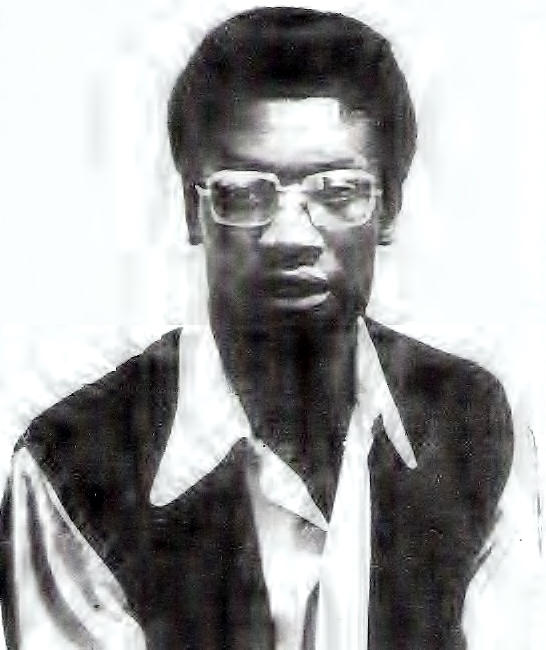Three men from South London jailed for stealing handbags on the London Underground and assaulting the police have cleared their names after almost half a century after they were convicted.
The Court of Appeal this morning quashed the convictions of Winston Trew, Sterling Christie and George Griffiths following a referral for appeal by the miscarriage of justice watchdog following new information concerning the disgraced police officer who led the arrest. In October Winston Trew spoke to the Justice Gap – see below – saying he was ‘cautiously optimistic’ that the men would finally clear their names. ‘It’s affected my life deeply,’ he said. ‘It cut off my future. I couldn’t plan anything.’
The Criminal Cases Review Commission, which has come under fire because of a dramatic collapse in the number of cases it refers to the Court of Appeal, said they were ‘delighted for Mr Trew, Mr Christie and Mr Griffiths’ known as the ‘Oval Four’. The fourth co-defendant has not been traced and is thought to have emigrated from the UK in the 1970s.
‘It is a good example of what we do at the CCRC,’ said commission chair Helen Pitcher. ‘We worked hard on this case, as we do on all our cases, and it is good to see our efforts recognised in this way. The age of this 1970s case created particular challenges and we had to go to great lengths to piece things together because so much of the case material had been destroyed.’
Pitcher said that the CCRC ‘sought out these cases’ after the conviction of Stephen Simmons for appeal last year based on the misconduct of the same police officer. ‘The Commission referred that case to the Court of Appeal and his conviction was quashed in January 2018 as a result of the misconduct of DS Ridgewell who was the lead officer involved in a series of cases which became known as the Stockwell Six, Waterloo Four and Tottenham Court Road Two (see below). The disgraced officer was to plead guilty in 1980 to conspiracy to steal and sentenced to seven years’ and died in prison in 1982.
‘The passage of time has meant that few if any records survive to help us understand how many similar cases there may be,’ Pitcher commented. ‘The CCRC would be very glad to hear from anyone who believes they were wrongly convicted where DS Ridgewell was involved.’
 Winston Trew, Sterling Christie, George Griffiths and Constantine ‘Omar’ Boucher were aged between 19 and 23 years when they were approached at the Oval underground station on March 16, 1972 by undercover police officers.
Winston Trew, Sterling Christie, George Griffiths and Constantine ‘Omar’ Boucher were aged between 19 and 23 years when they were approached at the Oval underground station on March 16, 1972 by undercover police officers.
According to Trew, the four men were accused of ‘nicking handbags’ on the tube and given ‘a good hiding there to confess to things we didn’t do’. The men were arrested, held in jail overnight and claim to have been beaten. They were sentenced to two years’ imprisonment which was reduced to eight months on appeal.
Talking to the Justice Gap, Winston Trew said he was ‘cautiously optimistic’ that the men would finally clear their names. ‘It’s affected my life deeply,’ he said. ‘It cut off my future. I couldn’t plan anything.’
Earlier in the year Trew attended the launch event for the last issue of the Justice Gap’s Proof magazine at the invitation of the Guardian journalist Duncan Campbell who has written about the case (here). Campbell was on a panel with Patrick Maguire of the Maguire Seven who was just 14 years old when was wrongly convicted along with members of his family. ‘I’m glad I spoke to Patrick. He said the devastating experience was with him all the time,’ Trew recalled. ‘His consciousness mirrors my consciousness. You can’t forget it. This could bring some closure.’
 As well as the Oval Four case, detective sergeant Derek Ridgewell was the lead police officer involved in a series of cases which became known as the Stockwell Six, Waterloo Four and Tottenham Court Road Two.
As well as the Oval Four case, detective sergeant Derek Ridgewell was the lead police officer involved in a series of cases which became known as the Stockwell Six, Waterloo Four and Tottenham Court Road Two.
Ridgewell would typically approach young black men on the tube, accuse them of theft and ‘verbal’ them – attributing incriminating fictitious remarks to enable an arrest. The appearance of Ridgewell in the run of similar cases eventually alerted the courts to some malpractice and he was moved to another job investigating mailbag theft. Whilst in this post he collaborated with two career criminals, splitting the proceeds from stolen mailbags. He was sent to jail for this crime in 1980 and he died in prison in 1982.
There have been multiple cases that called into question Ridgewell’s credibility but it was not until the case of Stephen Simmons reviewed by the CCRC and quashed by the Court of Appeal last year that a new application in relation to the Oval Four. Simmons was one of three young white men who were sat in a car playing music. They were approached by Ridgewell who accused the men of mailbag theft. All three were arrested, tried and jailed in 1976.
After his release, Simmons investigated his conviction. He discovered not only that Ridgewell himself was a convicted mailbag thief but he read about Winston Trew’s experience at Oval tube station at the hands of DS Ridgewell in Trew’s book Black for a Cause… Not Just Because.
After Simmons name had been cleared he said that Ridgewell ‘ruined three lives for no reason and I am sure many, many more and if this can help someone else who was also arrested by him then at least something will have been achieved’. After the conclusion of the Simmons case, Trew applied formally to the CCRC for his case to be reviewed. The appeal will only involve Winston Trew and Sterling Christie as the other two members of the Oval Four have left the country and cannot be located. Trew praised the work of the CCRC saying he was ‘very impressed’ by the quality of the CCRC’s investigation. ‘They have found out things about Ridgewell that I never knew.’
The CCRC said that their decision to refer the case to the Court of Appeal is based on ‘a real possibility that the Court will quash the conviction on the basis of new evidence and arguments concerning the integrity of DS Ridgewell’. The CCRC have also stated that they expect the case to be of ‘potential significance’ for other similar convictions.
Winston Trew recalled his confrontation with the police at Oval tube station as he and his friends returned from a community meeting to discuss the disproportionate amount of young black boys in ‘ESN’ (educationally subnormal) schools otherwise known as ‘sin bins’. ‘Because we’re were black activists we demanded they showed us their IDs. They must have been taken aback. They grabbed us, pushing, shoving and shouting “Turn out your bloody pockets”. The next thing I realized one of them had his hands around my throat trying to choke me.’
He also recounted how the four men were beaten up at the police station and forced to sign confessions. ‘I refused to sign anything and they came back with a statement from one of the others saying I was trying to pick pockets,’ he said. ‘I said he didn’t do this voluntarily. “You beat him up to make him sign it”.’
The four men were convicted on 10 to 2 majority. ‘Two of the jury didn’t believe what they said. But the truth is no match for consistent lies. It was four of us against 11 of them. Since 1973 till now I’ve been fighting to have my name cleared.’
This report draws on an article published on the Justice Gap in October by Julia Wynn (here). The interview with Winston Trew was conducted by Jon Robins







